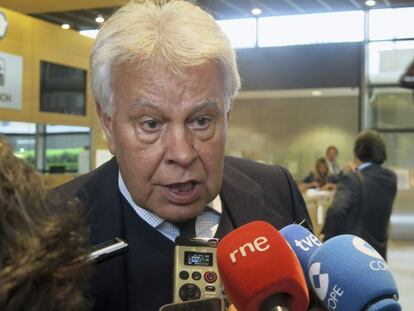Ex-PM González will try to travel to Venezuela again this weekend
Former Spanish Socialist leader has pledged to defend jailed opposition leader

After a first attempt last month, former Spanish Prime Minister Felipe González has said he will once again try to travel to Caracas this weekend to take part in the defense of jailed opposition leaders Leopoldo López and Caracas Mayor Antonio Ledezma.
The former Socialist Party leader, who has been warned by Venezuelan authorities that he cannot act as the opposition leaders’ lawyer, was scheduled to arrive in Bogota on Thursday to participate at a political conference organized by Colombian President Juan Manuel Santos.
González was forced to cancel his trip in May after Maduro postponed López’s trial
From there, he said he would travel to the Venezuelan capital.
In May, González was forced to cancel his trip to Caracas after the government of President Nicolás Maduro announced that it was postponing López’s trial. The closed-door trial is expected to resume next week.
The leader of the Voluntad Popular party and former mayor of the Caracas suburb of Chacao has been held at the Ramo Verde military prison since February 2014 on sedition and conspiracy charges related to the violent anti-government protests that took place that month. An estimated 40 people were killed during those riots and dozens more injured.
To protest their unfair treatment, López and another jailed opposition official, former San Cristóbal Mayor Daniel Ceballos, are on hunger strikes and both men are in poor health, their lawyers have told EFE news agency.
López and Ceballos are in poor health after going on hunger strikes, say their lawyers
Ceballos went on a hunger strike on May 22 and was joined by López a few days later.
On Saturday, thousands marched in around 30 cities across Venezuela to demand the release of all political prisoners.
Ruling party lawmakers in Venezuela have declared González persona non grata, and last week Maduro criticized the former Spanish prime minister’s attempts to involve himself in the country’s internal affairs.
González has reiterated that he wants to help the jailed opposition leaders because he was concerned about the deteriorating human rights situation in Venezuela.
Although González will be traveling with a diplomatic passport, the Foreign Ministry in Caracas has told the Spanish ambassador that the former prime minister will not have the protection of Venezuelan authorities.
González will join the legal team as an outside consultant but will not litigate before the court
Other officials, such as Ombudsman Tarek William Saab and Attorney General Luisa Ortega Díaz, have said that González is prohibited under Venezuelan law from joining the defendants’ defense teams in court.
Both López’s wife Lilian Tintori and his chief lawyer Juan Carlos Gutiérrez explained last week that González would join the legal team as an outside consultant, but would not litigate before the court.
Venezuelan authorities have been very strict in permitting high-level foreign officials from visiting López or Ceballos. Last week, the former presidents of Bolivia, Jorge Quiroga, and Colombia, Andrés Pastrana, were prohibited from entering either the Ramo Verde military prison or the regular penitentiary where Ceballos was transferred last month.
This was the second time that Pastrana had been turned away. In January, the former Colombia leader was kept from meeting with López after he traveled to Caracas alongside former Chilean President Sebastián Piñeda.
“Venezuela is not a dictatorship; it is a democracy that is choking freedoms,” González said on Tuesday in Brussels after meeting with European Commission President Jean-Claude Juncker.
He called on all Venezuelans to vote in this year’s local and parliamentary elections because they “don’t deserve this failure of political and economic action.”
Although the elections are scheduled for later this year, the Maduro government has not yet set an exact date.
Tu suscripción se está usando en otro dispositivo
¿Quieres añadir otro usuario a tu suscripción?
Si continúas leyendo en este dispositivo, no se podrá leer en el otro.
FlechaTu suscripción se está usando en otro dispositivo y solo puedes acceder a EL PAÍS desde un dispositivo a la vez.
Si quieres compartir tu cuenta, cambia tu suscripción a la modalidad Premium, así podrás añadir otro usuario. Cada uno accederá con su propia cuenta de email, lo que os permitirá personalizar vuestra experiencia en EL PAÍS.
¿Tienes una suscripción de empresa? Accede aquí para contratar más cuentas.
En el caso de no saber quién está usando tu cuenta, te recomendamos cambiar tu contraseña aquí.
Si decides continuar compartiendo tu cuenta, este mensaje se mostrará en tu dispositivo y en el de la otra persona que está usando tu cuenta de forma indefinida, afectando a tu experiencia de lectura. Puedes consultar aquí los términos y condiciones de la suscripción digital.








































